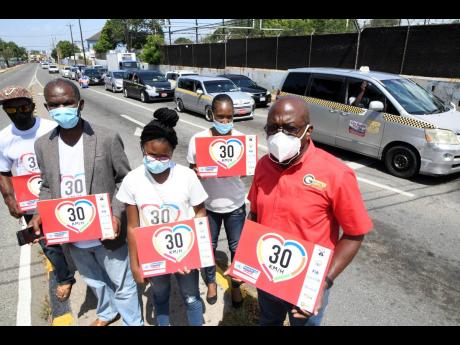Busmen, cabbies gear up for fare hike strike
Taxi and bus operators are prepared to strike on Thursday as they press for a long-overdue fare increase.
President of the Transport Operators Development Sustainable Services (TODSS), Egeton Newman, said if Transport Minister Robert Montague does not intervene by Wednesday, the strike will go as planned.
“Our operators are not coping. They are suffering the pangs of hell without a fare increase,” he lamented of the freeze on increases for eight years.
Newman argued that operators are affected by the constant increase in gas prices and the sliding dollar, among other issues.
Buses and taxis licensed to operate on government route franchises have long criticised the process for rate reviews, a power that lies within the purview of the Ministry of Transport. That convergence of politics and economics has often caused decision-making to lean heavily in favour of passengers because of the threat of public foment which could have consequences at the polls.
Newman is open to the establishment of an independent commission to assess the current fare scale and recommend increases.
“Maybe that’s what we need to call for, and that’s going to take some time, but we need the increase now,” he told The Gleaner.
Founding director of the Institute of Law and Economics, Professor Rosalea Hamilton, weighed in on the matter, noting that it raises a lot of questions about the nature of the regulated industry.
“If you compare it to the regulation of the utilities, whereas the price is pretty much set, in collaboration with Government, there is some guarantee on returns,” the economist explained.
She continued: “How do we expect these businesses to survive in the context of all of the fluctuations in the market with gas prices being just one of them? Engine parts, the deterioration of the roads after the hurricanes or floods are other issues they have to deal with.”
The Office of Utilities Regulation monitors standards and rates in the electricity and water industries, among others.
Hamilton said that fluctuations in prices seriously impact the profitability of transport operators. Suggesting that a mere fare hike was not enough, she said that a more fundamental overhaul was required.
“It has been unfair for a long time and, therefore, that arrangement should change. I don’t think the answer is simply to have a price increase,” Hamilton said.
Like the utilities, she said there ought to be a relationship between the profitability of the business of transport operators and some guarantee of sustainability.

